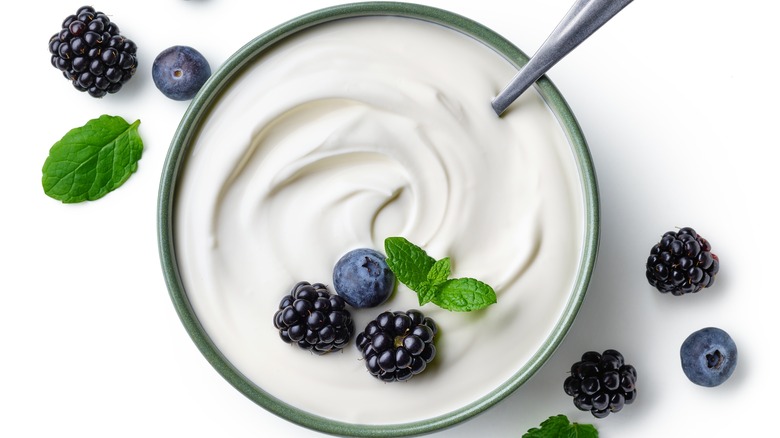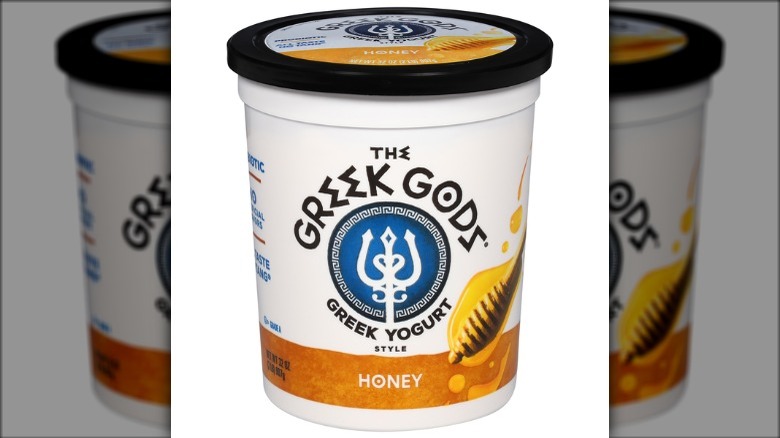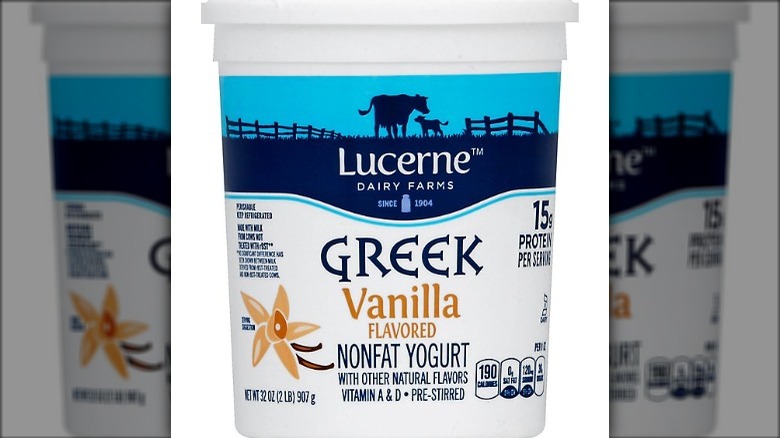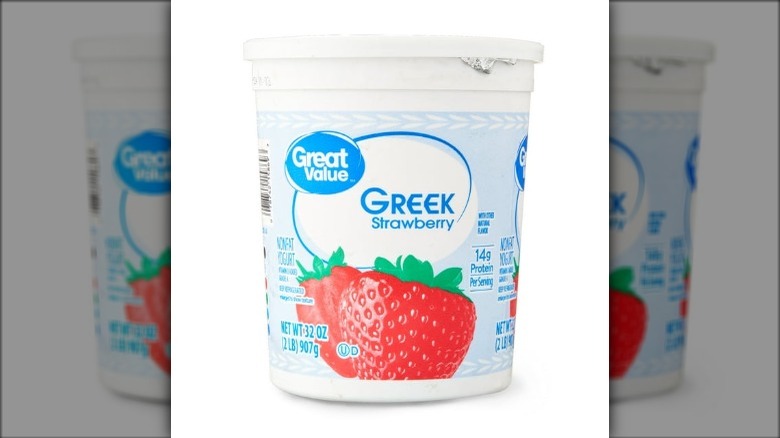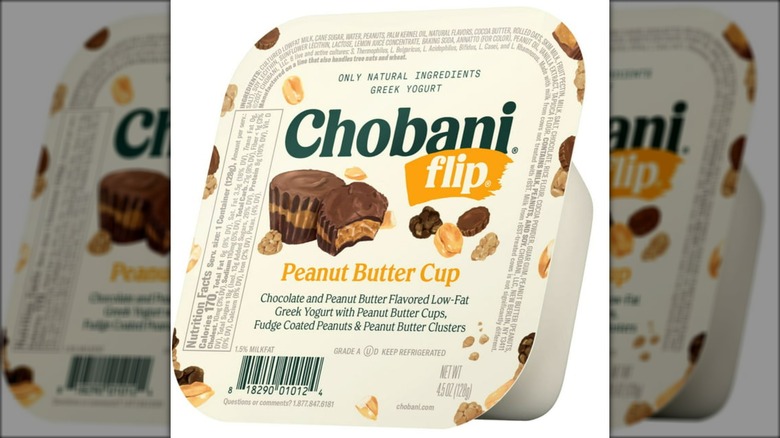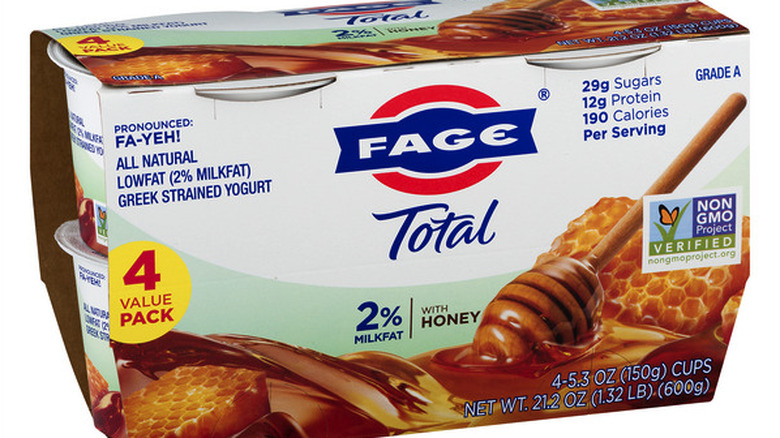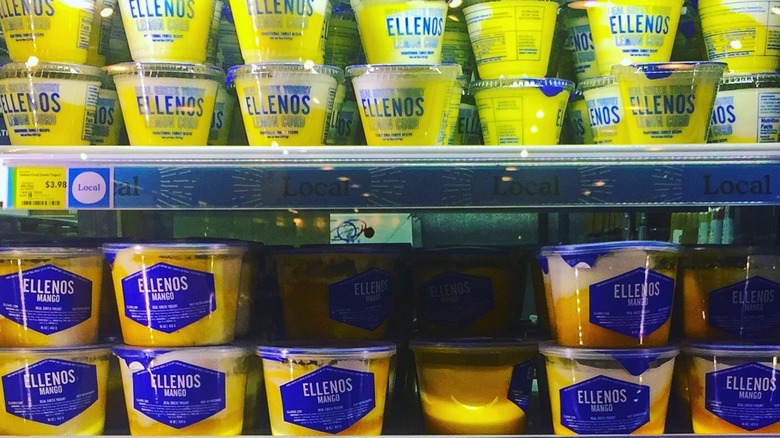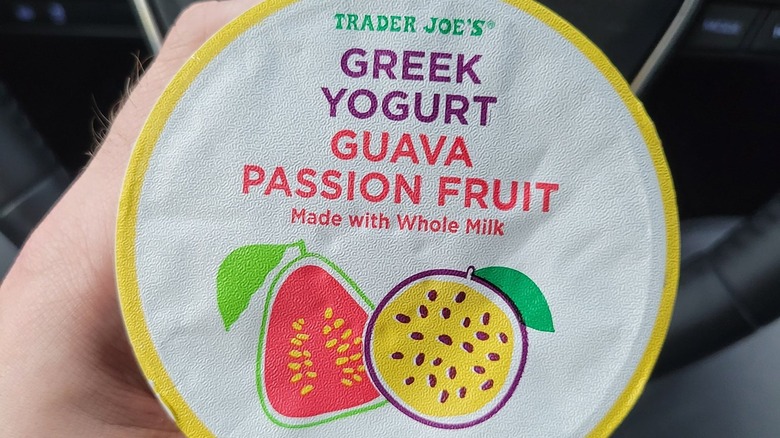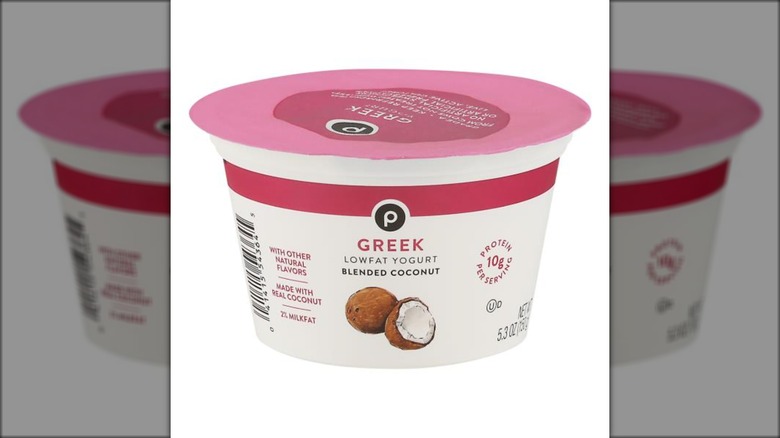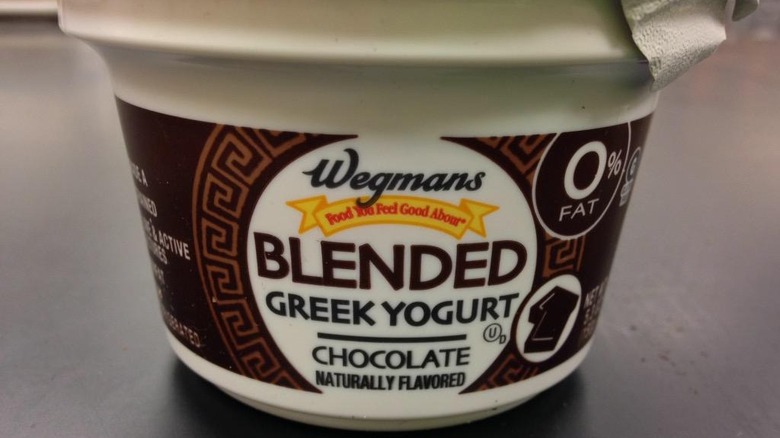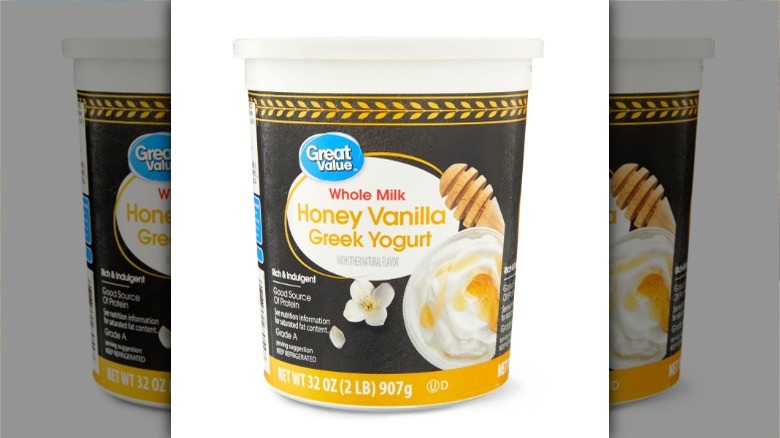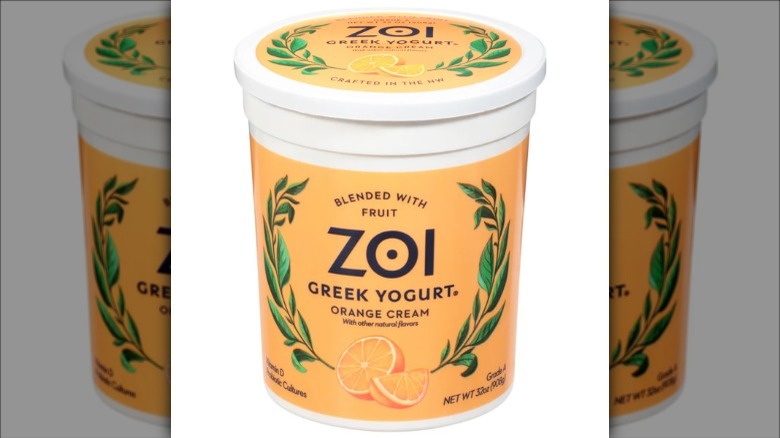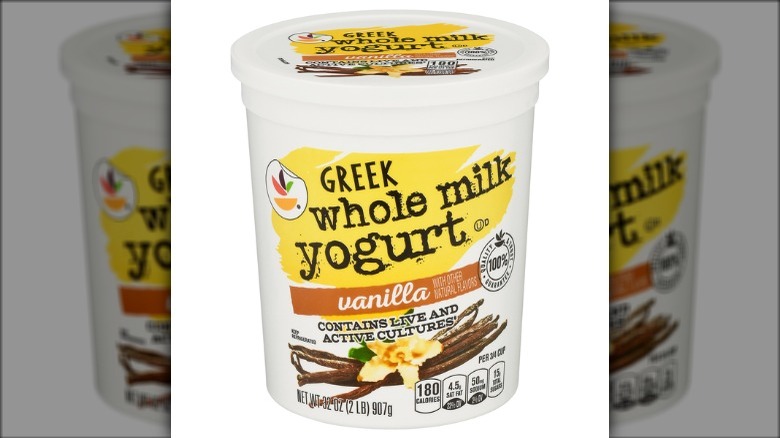12 Store-Bought Greek Yogurts That Are Surprisingly Unhealthy
Eating Greek yogurt can be great for your health goals, but some options can derail your best-laid intentions. Yogurt is often linked with healthy diets: A 2020 study published in Nutrients showed that people who reported eating yogurt tended to have a healthier body mass index (BMI) and more nutrient-dense diets.
Greek yogurt is different from regular yogurt because it's strained to remove whey and other liquids in regular yogurt. The result is often thicker and tangier. It's a hit with health enthusiasts because it tends to have more protein per serving, which can help to build muscle and keep you full for longer. Plus, greek yogurt is often a secret ingredient in many recipes, serving as a lighter substitute for sour cream or butter.
Despite the health benefits, there are two main areas where even Greek yogurt can go wrong: saturated fat and sugar content. Diets high in saturated fat can lead to elevated cholesterol levels, which in turn can put you at greater risk of heart disease and stroke. Small amounts of sugar are always in yogurt because of the naturally occurring lactose in all dairy products, which isn't harmful. But added sugars are a different story, and they can show up in large quantities in some Greek yogurts. While it might satisfy your sweet tooth, too much sugar in a diet can contribute to obesity, a higher risk of Type 2 diabetes, and other health complications. Here are 12 Greek yogurt options that are surprisingly unhealthy, chosen for their higher-than-average levels of saturated fat, added sugars, or both.
1. The Greek Gods Honey Greek Yogurt
If you've ever looked into making healthier choices for breakfast, you've likely seen the recommendation to drizzle a little bit of honey on top of plain Greek yogurt, and maybe add some berries or granola. But make no mistake: Buying the Greek yogurt with the honey flavor already added is not the same.
In the case of the Greek Gods brand, the yogurt is delightfully smooth because it lists cream as its third ingredient, after milk and cane sugar. That cream contributes 5 grams of saturated fat per cup of yogurt, for a full quarter of your recommended saturated fat content before you've even gotten to 9 a.m.
A cup of yogurt is admittedly more than most serving sizes of Greek yogurt (8 ounces compared to the average 5.3). But it still doesn't excuse the massive sugar load that comes from the added cane sugar, brown cane sugar, and honey that's used to sweeten this up. It all adds up to a whopping 15 grams of added sugar, or about 30% of the recommended daily amount. All of that sugar is why registered dietitian Mary Wirtz tells Buzzfeed it's one of the unhealthiest yogurts on the market — Greek or otherwise. "Unfortunately, that is more sugar than five Oreo cookies," she states.
2. Lucerne Vanilla Greek Yogurt
Lucerne is a private label store brand owned by Safeway grocery stores, which are located primarily in the western United States (there are some Safeway locations on the East Coast as well). The two don't associate closely with one another, giving Lucerne the appearance of an independent label.
Lucerne's vanilla Greek yogurt doesn't contain any fat content, so it's a fine option on that front. But it does contain 11 grams of added sugar, or 22% of the recommended daily intake. For a plain vanilla flavor, that's a fairly hefty sugar load for just 5 ounces of yogurt. One point in its favor is that it contains 12 grams of protein — almost a quarter of the recommended daily protein, which is slightly more than most brands. The average amount in a 5.3-ounce cup of Greek yogurt is typically about 10 grams of protein, based on the majority of flavors we researched.
Despite the sugar being on the high side, it's clear the brand is trying to provide healthier options. The same Lucerne vanilla option in 2023 contained 22 grams of total sugar with 15 grams of added sugar, or a full 30% of the daily recommended value. It seems as if the yogurt was reformulated and cut the sugar content significantly. It's not perfect, but it appears that the brand is attempting to provide at least slightly healthier options than before.
3. Great Value Strawberry Greek Yogurt
If you shop at Walmart, you've encountered its Great Value store brand over and over. Some products like Great Value cream cheese are a hit with customers, but other Great Value products should be avoided, despite their often lower price tags. Based on the nutritional content of the strawberry Greek yogurt, it likely goes into the "do not buy" column.
To start with the good news: The Great Value strawberry Greek yogurt doesn't contain any fat, saturated or otherwise. It also contains 14 grams of protein in a 6-ounce serving — again, more than the norm for others on this list, and for Greek yogurt in general. That fulfills more than a quarter of the protein most adults need in a day. But the bad news: The sugar content is high. It matches protein gram-for-gram with 14 grams of added sugar, or 28% of the sugar we'd need in a day. That's like taking a cup of plain Greek yogurt, adding some strawberries, and then stirring in more than three whole teaspoons of sugar to top it off.
4. Chobani Flip Low Fat Peanut Butter Cup
You might think that eating your dessert in Greek yogurt form is a better alternative to eating an actual candy bar. In most cases you'd be right, but the Flips line from Chobani gives chocolate treats a run for its money.
Once again, the focus here is the sugar content. It's worth noting that Americans consume an average of 17 teaspoons of sugar (71 grams) per day — two to three times the recommended amount. According to the American Heart Association, this recommended number is 36 grams for men and 25 grams for women. Some of the excess sugar consumption comes from more obvious sources like soda and donuts, but the sneaky amounts in some Greek yogurt flavors can also contribute to that tally. This peanut butter cup version is no exception — it contains 16 grams of added sugar, a third of the recommended daily value. Other flavors like the Flip Salted Caramel Crunch are slightly better but not great, with 12 grams of added sugar.
It's also worth noting that just because something says it's "low-fat" doesn't mean it's automatically a better option for you personally. The peanut butter cup flavor still contains almost 20% of your recommended saturated fat for the day. That's a fine choice to make if the rest of your diet is balanced, but if you're watching your fat intake, "low-fat" can still mean a significant amount. In fact, it's only 4% less than two actual Reese's cups.
5. Fage Total 2% with honey
Fage Greek yogurts often top the list when nutritionists recommend the healthiest yogurts on the market. But keep in mind, those are often the nonfat, plain varieties. Anything with flavoring requires a closer look at the nutrition label: The brand alone doesn't make it healthy.
That's definitely the case here with the honey flavor. Fat content is low, and protein content is pretty good at 24% of the daily recommended value (which is typical for the Fage brand). What's not typical is the sugar content: This flavor contains 25 grams of added sugar, with a total of 29 grams. That is literally half of the recommended sugar intake for the entire day — in just one regular 5.3-ounce container of Greek yogurt!
For reference, that is the same amount of sugar as a mini can of Coca-Cola. Granted, the rest of the yogurt contains better nutrition than the soda does, but based on sugar content alone, they're equals.
6. Ellenos Lemon Curd Greek Yogurt
When initially conducting research for this article, we almost skipped over checking the Ellenos brand of Greek yogurt, since it's a small yogurt brand that is distributed nationally through Whole Foods. How bad could it really be, if it's got the Whole Foods stamp of approval?
Well, it's certainly not the most sugar-conscious, even if its unique flavors of lemon curd, strawberry shortcake, passion fruit, and marionberry are intriguing. Take the lemon curd flavor for example: It might have traces of tart lemon flavor, but each yogurt cup contains 4.5 grams of saturated fat (23% of the daily value) and 17 grams of added sugar. Not exactly the profile of a sensibly balanced snack.
We expected a flavor like strawberry shortcake to be slightly more unhealthy, but by just how much was kind of incredible. This flavor, which is truly more of a dessert, has 35% of the recommended daily saturated fat, and 20 grams of added sugar (40%). Upon closer inspection, the brand's homepage motto is "the yogurt that makes ice cream jealous" — and suddenly the nutrition information makes sense. For as delicious as this yogurt probably is, you'd probably want to eat it as sparingly as a bowl of ice cream.
7. Trader Joe's Whole Milk Guava Passion Fruit Greek Yogurt
Plenty of Trader Joe's foods have a cult following — and for good reason. However, it seems that the chain's Greek yogurt offerings might be better left on shelves. In a head-to-head ranking, Bon Appétit deemed Trader Joe's plain Greek yogurt a "disappointment." Reviewers found the flavor to be decent, but the consistency to be watery and thin — definitely not the thick, creamy texture most people want in their Greek yogurt.
While the plain Greek yogurt is a healthy option, if perhaps a lackluster one, Trader Joe's guava passion fruit yogurt cups are worth skipping for other reasons. The brand certainly earns creativity points, as you don't see a flavor combination like this very often in yogurts. However, the ingredients necessary to make it taste good — cane sugar and fruit juices — stack up to 13 grams of added sugar, or more than a quarter of the daily recommended amount. It also contains 20% of the recommended saturated fat, which is higher than most Greek yogurt offerings.
If you do most of your shopping at Trader Joe's and still want a somewhat-healthy option, consider the apricot mango version instead. It's still somewhat high in added sugar (9 grams, compared to 13). That said, if you only prefer Greek yogurts with fruit flavoring already added, this one is less likely to cause blood sugar spikes. Plus, it's still more unique than your standard blueberry or strawberry choices.
8. Publix Blended Coconut
Publix stores are located primarily in the Southeast, with high concentrations in Florida, Georgia, and Alabama. Store brands are nothing to scoff at, and often offer a lower-cost product that can be just as delicious as national brands. A collaboration between Greek yogurt and coconut products should be a match made in health heaven, as coconut is often associated with wholesome freshness. But in the case of this store-brand yogurt, it misses the mark when it comes to nutritional balance.
Instead of simply blending yogurt with shaved coconut — what we want to believe happens behind the scenes — the milk is mixed with a "coconut flavor preparation", which consists of cane sugar, water, and dried coconut, along with cornstarch and other additives.
The end result might be tasty and full of actual coconut flavor, but it's laced with sugar too. It all adds up to 19 grams of total sugar, with 15 of those added after the natural yogurt-making process. For reference, that's almost a third of the recommended daily sugar intake, in just one small cup of yogurt. If coconut flavor is what you're after, the healthier alternative would be to sprinkle toasted coconut on top of plain Greek yogurt.
9. Wegmans Chocolate Greek Yogurt
If making chocolate Greek yogurt was just a matter of mixing cocoa powder with plain yogurt, it might end up being a pretty healthy option. But unfortunately, sugar is required to balance out the bitterness of plain cocoa. The store brand of Greek yogurt for Wegmans — an upscale chain mostly in the Northeast — has some points in its favor, but it ends up being an overly sweet offering.
The chocolate-blended Greek yogurt is low in fat, and its ingredients are fairly simple: Milk, cream, sugar, and cocoa powder are in the first four. Cornstarch is added to thicken the mixture, which isn't necessary for high-quality Greek yogurts since straining the mixture should make it thick enough. That being said, it's probably incorporated so that less milk is used, which keeps costs down.
The issue with this yogurt, as with many on the list, is its sugar content. Each container has 14 grams of added sugar, which is over a quarter of the recommended amount most adults should have in a day. That said, it does have far less fat and sugar than most servings of chocolate, so if you're looking to tame your sweet tooth one choice at a time, this might be a solid way to start making slightly more balanced choices overall.
10. Great Value Honey Vanilla Whole Milk Greek Yogurt
If you haven't picked up on which particular Greek yogurt flavor to avoid if you're worried about sugar intake, you haven't been paying attention. This Walmart brand of Greek yogurt is the third honey-flavored offering on this list that is loaded with unnecessary sugar — each one as sweet as the last.
In this case, there's more than one culprit, since this yogurt also contains 5 grams of saturated fat, or a quarter of the daily recommended amount. As for that sugar load: This honey vanilla flavor has 23 grams of total sugar, 15 grams of which are added in.
Honey might have a reputation of being a natural and healthy sweetener, at least compared to cane sugar. But just because a yogurt is honey-flavored doesn't mean it's the only sweetener used in the recipe. In fact, this yogurt has four total sweetening agents that tally up to those 15 grams — cane sugar, brown sugar, honey, and pectin are all in the mix.
We've said it before, and we'll say it again: Purchasing plain Greek yogurt and adding honey to it yourself is a much better way to get the health benefits of yogurt while avoiding excessive added sugars (try checking out this trick to make your yogurt even more nutritious).
11. Zoi Orange Cream Greek Yogurt
The Zoi brand of Greek yogurts is based mostly in the Pacific Northwest, and offers a bright and fresh take on Greek yogurt. A lot of that comes down to the pleasing aesthetics of its label designs and clever marketing, with names like "raspberry cream" and "honey strawberry." The names alone indicate you're going to get a rich, flavorful spoonful of yogurt each time.
On Zoi's webpage promoting its orange cream flavor, the images of parfaits feature creamy yogurt, crunchy granola, and juicy mandarin oranges, which we can imagine work together for a truly delicious bite. Less obvious are the nutritional trade-offs customers will make for these delectable-sounding yogurts. One serving of the orange cream flavor contains 20% of your saturated fat for the day. It also contains a whopping 22 grams of added sugar, which amounts to almost half of the daily recommended amount of sugar.
12. Giant Whole Milk Vanilla Greek Yogurt
This is a reminder that plain Greek yogurt is not the same as vanilla Greek yogurt. Plain varieties have no flavoring, and typically no sugar added. Vanilla flavors often have both. The store brand for the Giant and Giant Eagle grocery chain, located primarily in the Northeast, has a variety of fairly healthy Greek yogurt options — you'd just need to see for yourself how they compare to other popular Greek yogurt brands, which we've conveniently ranked for you.
In this case, however, the fat and sugar content are higher than average, and take this yogurt from a healthy snack to one that you'd need to consider more carefully. Since it's made with whole milk, it has 22% of the recommended saturated fat for the day. It also has 10 grams of added sugar. That's certainly less than others on this list, but still adds up to more than 20% of the recommended sugar intake for the day.
There's one bright spot within its nutritional facts: Each 6-ounce serving contains 13 grams of protein, which is higher than the norm for other Greek yogurts on this list. So if you do choose to eat this yogurt, it's likely to help keep you full longer until it's time for your next meal.
13. Methodology
As we mentioned in our intro, not all Greek yogurts are created equal. Since saturated fat and added sugars are the two main culprits that can take Greek yogurt from a healthy breakfast to a once-in-a-while dessert — at least nutrition-wise — we paid the most attention to those servings on the nutrition labels. We also glanced at the ingredients list to see what those forms of sugar were. Most times it was common cane sugar, but we also noted if there were multiple sources of sweeteners in each product.
The brands chosen needed to have a wide retail reach to warrant a mention on the list: Small-scale yogurt makers weren't considered. Some brands like Chobani and Great Value are easily found across the United States. Other store brands like Trader Joe's, Lucerne, Giant, Publix, and Wegmans have a wide regional presence in their respective supermarkets. And others, like Ellenos and Zoi, started as fairly small brands but are distributed through national retailers like Whole Foods (and therefore Amazon).
